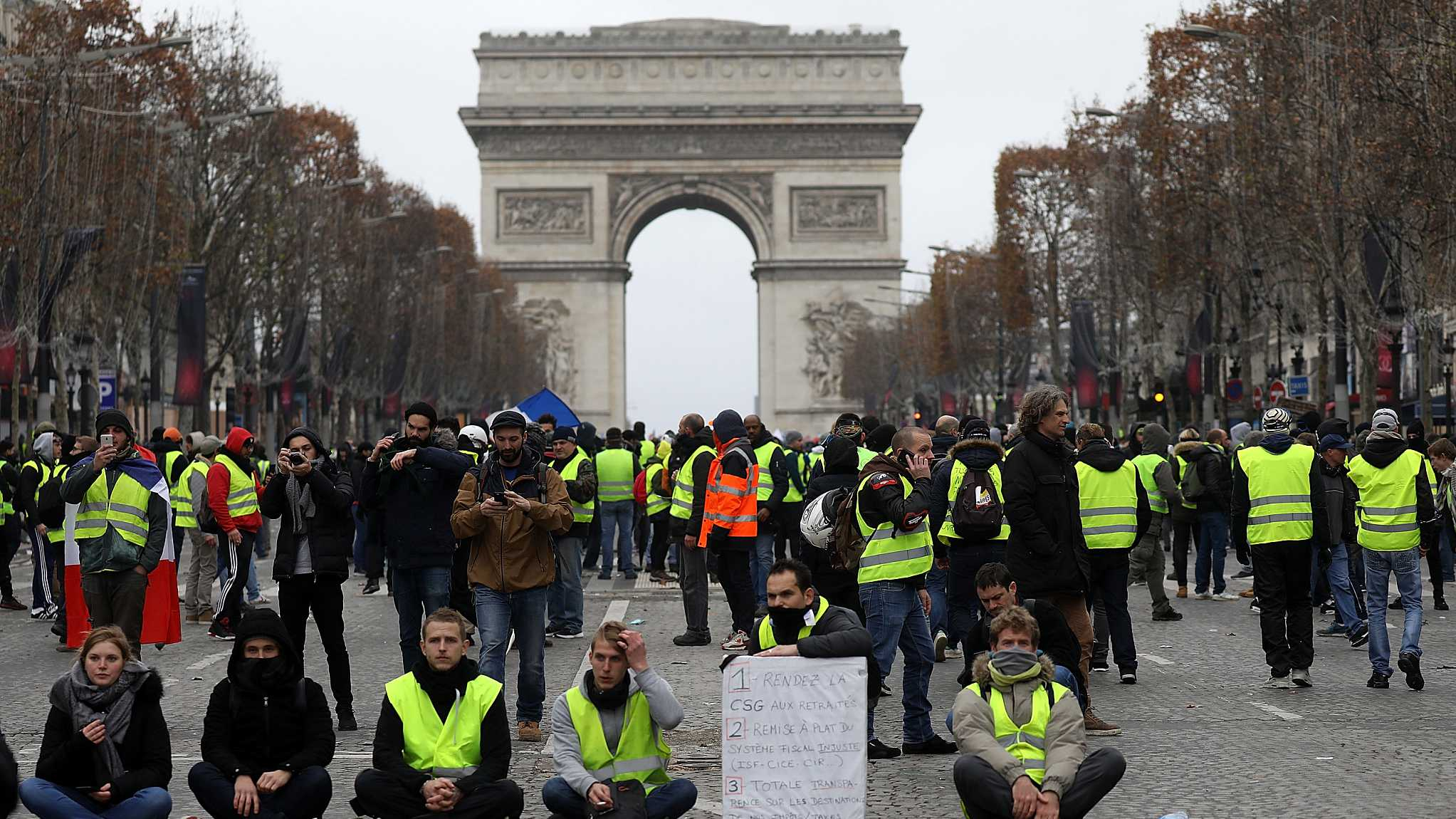
Opinions
12:03, 10-Dec-2018
Opinion: 'Yellow vest' movement signifies the failure of neoliberalism
Updated
11:21, 13-Dec-2018
Tom Fowdy

Editor's note: Tom Fowdy is a UK-based political analyst. The article reflects the author's views, and not necessarily those of CGTN.
This weekend saw riots, violence, and disorder sweep Paris for the fourth time in a row. In chaotic scenes, over 100 were injured, 1000 were detained. Protesters burned vehicles, shops and public property leading to widespread damage and destruction.
Despite large concessions by the French government over the controversial fuel tax which sparked the protests, the "yellow vest" movement has continued unabated, citing a disdain for politicians and false promises in general.

A protester with a French flag stands at the Champs Elysees in Paris, December 8, 2018. /VCG Photo
A protester with a French flag stands at the Champs Elysees in Paris, December 8, 2018. /VCG Photo
Although France is particularly known for its somewhat aggressive industrial action, the scenes in Paris and the widespread support for it illustrate an outburst of frustration over an economic order which is letting its people down. Similar to U.S. polls and Brexit, it is naive to call it a conspiracy hatched by a foreign adversary. Instead, socio-economic flaws within the West are creating new forms of radical and destabilizing politics that express contempt for normality.
Emmanuel Macron has become the figurehead of an elite class that many ordinary French people growingly despise. The former investment banker rose to power not on a wave of popularity, but as a last resort for what otherwise was a poor-quality set of presidential choices. The "En Marche" centrist coalition seemed refreshing against the scandal-hit French center-right, the uninspiring center-left and of course, the much-feared influence of the far right Front Nationale and Marine Le-Penn.
By the world media, of course, Macron was praised for daring to endorse the "radical center," the liberal philosophy and thus, the economic system which is craved as the undisputed solution to all problems. It was also claimed that Macron's example has shown that the "populist wave," throughout the Western world, could be contained and there was hope for the neo-liberal status quo under the banner of a new, enthusiastic image.
Of course, using an overwhelming victory over a fascist candidate to make such a point doesn't hold up well, and inevitably it hasn't. Macron's honeymoon period is now long over. Not even 18 months after his election and the French president has become as detested as his predecessors.

An ambulance service halted in support of the "yellow jacket" movement in Paris, December 3, 2018. /VCG Photo
An ambulance service halted in support of the "yellow jacket" movement in Paris, December 3, 2018. /VCG Photo
Namely, for his attempts to push upon the public a series of economic reforms deemed only to benefit the super-rich. For everyone else, the much-hated diesel tax had only become the epitome of the soaring cost of living, shrinking opportunities and the long-term decline of the French working class. Therefore, the levy was just a tip of the iceberg of widespread dissatisfaction. Its removal has consequentially not been able to stop the rolling snowball it has created.
People want real change in France. When socio-economic problems go unchecked, those affected become disillusioned and begin to lose an incentive to support the existing moral and political order. Thus, radical ideologies, ideas, and actions begin to emerge from the fringes which strive to change it, and not always for the better.
Yet, in France right now, as all over the Western world, gaping problems in the economic system have been simply ignored and the result has been the production of highly damaging forms of politics. As noted, Brexit in Britain and Trump in the U.S. stand amongst the most devastating examples.
Both of these outcomes occurred because politicians in both cases were dismissive of mass disillusionment brought about by long-term structural economic shifts and class displacement, a product of contemporary neoliberalism. The warning signs were already there in France given how well the Front Nationale did the year previously.
The "yellow vest" movement is obviously not a radical nationalist movement like these two, being a trade union effort, nevertheless, its socio-economic causes are broadly interconnected. They are all populist revolts against the status quo by angry, left behind blue-collar groups, even if each ideological expression of it differs accordingly.
In France, the "yellow vest" movement is out to force a permanent change in France's socio-economic order. It is a sign that neoliberalism has failed. In essence, it is quasi-revolutionary in character. How long it lasts or where it will head is unknown. But for the time being it seems all intend to end the premiership of Macron. Either way, it is up to the French authorities to listen and inspect themselves. This cannot be written off as simple troublemaking or foreign interference, there ought to be changed, big change.
(If you want to contribute and have specific expertise, contact us at opinions@cgtn.com.)

SITEMAP
Copyright © 2018 CGTN. Beijing ICP prepared NO.16065310-3
Copyright © 2018 CGTN. Beijing ICP prepared NO.16065310-3